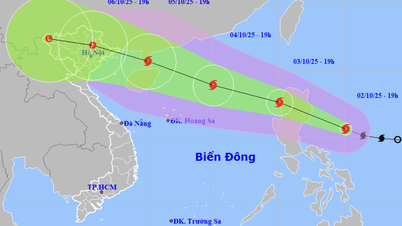The US state of California and the European Union (EU) are about to pass regulations requiring large businesses to disclose their greenhouse gas emissions. Transparency about emissions will contribute to improving the role and responsibility of businesses in climate change.
At the New York City Climate Week event held in mid-September, California Governor Gavin Newsom announced that he was about to sign SB 253, which requires large businesses to disclose their greenhouse gas emissions. Previously, SB 253 was voted on unanimously in both the California House of Representatives and the California Senate.
[caption id="attachment_435915" align="aligncenter" width="768"] SB 253 requires large businesses operating in California and generating more than $1 billion in annual revenue to disclose their greenhouse gas emissions, including emissions from suppliers and customers. Photo: Getty[/caption]
SB 253 requires large businesses operating in California and generating more than $1 billion in annual revenue to disclose their greenhouse gas emissions, including emissions from suppliers and customers. Photo: Getty[/caption]The bill would require California businesses with more than $1 billion in annual revenue to report the emissions of their operations, the energy they use, and those of their suppliers and customers, beginning in 2026.
The bill is expected to impact more than 5,300 major businesses, including some of the world's most famous multinationals such as Amazon, Chevron, McDonalds, Kroger and Walmart.
Under the bill, emissions disclosures would have to be independently verified by an outside consultant, an “independent third-party assurance provider.” The aim of the legislation is to hold large companies accountable for their role in climate change. For years, many companies have promoted themselves as environmental stewards while not fully disclosing their emissions. Increased corporate transparency about emissions could lead to publicly available lists of top polluters, holding large corporations more accountable. “We need robust transparency to level the playing field between private and public companies,” said Senator Scott Wiener, a San Francisco Democrat who authored the bill. “Once again, California is leading the nation on essential climate action.” Similar regulations are currently being considered by the European Parliament and EU member governments and are expected to be approved in the coming months. Vietnam guides businesses in reporting greenhouse gas emissionsIn Vietnam, the business community is identified as playing a very important role, both as a subject affected by climate change and as an important subject directly participating.
In early August 2023, the State Securities Commission coordinated with the International Finance Corporation (IFC) to launch the Greenhouse Gas Emission Reporting Handbook.
[caption id="attachment_435926" align="aligncenter" width="768"] Vietnamese businesses are instructed to report greenhouse gas emissions. Photo: VnEconomy[/caption]
Vietnamese businesses are instructed to report greenhouse gas emissions. Photo: VnEconomy[/caption]The handbook was developed by the State Securities Commission with technical support from IFC, the Swiss State Secretariat for Economic Affairs (SECO) and the UK National Standards Institute (BSI).
The handbook is divided into three main parts: Part one provides general background information, relevant definitions and concepts such as Greenhouse Gases, Net Zero Emissions, Carbon Dioxide Equivalent, Global Warming Potential (GWP).
The second part relates to Vietnam's regulations and standards as well as international standards and practices currently in effect related to greenhouse gas inventory and reporting. These are regulations on the subjects of business sectors that must conduct greenhouse gas reporting according to Vietnam's regulations, international standards and norms recognized by Vietnam as well as related standards and databases that are very popular in the international market.
The third part is the core part of the Handbook introducing the process of Greenhouse Gas Inventory and Reporting at the organizational level in which the most basic steps of the Greenhouse Gas Inventory and Reporting process are introduced in a concise and practical manner such as determining the scope and boundaries of greenhouse gas emissions for the organization, determining the base year, identifying greenhouse gas emission sources, quantifying and reporting on the organization's greenhouse gas emissions, how to identify measures that can be applied to reduce or eliminate greenhouse gas emissions, verifying and verifying greenhouse gas emissions.According to the drafting unit, the Handbook aims to help businesses conduct inventories and report greenhouse gas emissions more easily; help businesses meet legal regulations and requirements related to customer and supply chain information disclosure, as well as help businesses start the journey towards net zero emissions. This is also an essential component in the roadmap towards net zero emissions and the first foundation of any business sustainability strategy.
Therefore, this Handbook is expected to be a useful handbook for businesses to apply in the process of implementing regulations on reporting and disclosing sustainable development information.
Minh Thai


![[Photo] General Secretary To Lam attends the 8th Congress of the Central Public Security Party Committee](https://vphoto.vietnam.vn/thumb/1200x675/vietnam/resource/IMAGE/2025/10/4/79fadf490f674dc483794f2d955f6045)
![[Photo] Solemn opening of the 8th Congress of the Central Public Security Party Committee, term 2025-2030](https://vphoto.vietnam.vn/thumb/1200x675/vietnam/resource/IMAGE/2025/10/4/f3b00fb779f44979809441a4dac5c7df)
![[Photo] Bustling Mid-Autumn Festival at the Museum of Ethnology](https://vphoto.vietnam.vn/thumb/1200x675/vietnam/resource/IMAGE/2025/10/4/da8d5927734d4ca58e3eced14bc435a3)



















![[Video] Musician Tran Tien was honored at the 18th Bui Xuan Phai - For the Love of Hanoi Awards Ceremony in 2025](https://vphoto.vietnam.vn/thumb/402x226/vietnam/resource/IMAGE/2025/10/4/997d58f8d03845bda13470208b197f5e)









































![[VIDEO] Summary of Petrovietnam's 50th Anniversary Ceremony](https://vphoto.vietnam.vn/thumb/402x226/vietnam/resource/IMAGE/2025/10/4/abe133bdb8114793a16d4fe3e5bd0f12)
![[VIDEO] GENERAL SECRETARY TO LAM AWARDS PETROVIETNAM 8 GOLDEN WORDS: "PIONEER - EXCELLENT - SUSTAINABLE - GLOBAL"](https://vphoto.vietnam.vn/thumb/402x226/vietnam/resource/IMAGE/2025/7/23/c2fdb48863e846cfa9fb8e6ea9cf44e7)































Comment (0)